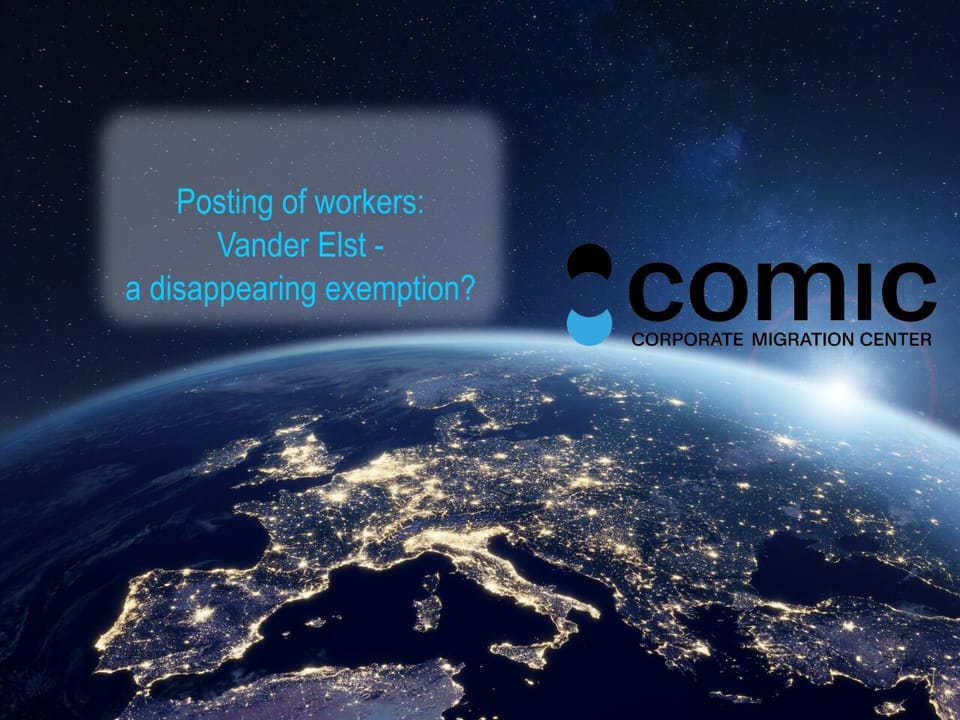Posting of workers - Vander Elst - A disappearing exemption?

Greece joins the “non-compliance club”
Article 71 of the Greek Immigration Code recently amended reads as follows:
Citizens of third countries moving from a company established in an EU or EEA member state for the purpose of providing a service
1. To citizens of third countries who wish to enter the country as legal workers in a company established in another member state of the European Union or the European Economic Area for the provision of a specific service, in the context of a relevant contractual obligation between the above company and the counterparty, who carries out his activities in Greece, is granted a national entry visa that allows residence for work reasons, provided that they present in person or send by e-mail or by registered letter to the competent Greek consular authority:
[……….:]
2. The entry visa has a duration equal to the time required to fulfill the contractual obligation assumed by the company established in another member state of the European Union or the European Economic Area and cannot exceed a total of one (1) year.
Such a visa is required for stay that exceed 90 days (in any 180-day period), and it appears that the national visa must be obtained before the assignment is initiated.
Another Member State in breach of EU law, notably of Article 56TFEU (freedom to provide services) as interpreted by settled European Court of Justice case-law (see inter alia Judgment of the Court of 9 August 1994, Raymond Vander Elst, C-43/93, EU:C:1994:310).
In must be recalled that Member States may not subject the posting of workers who are nationals of a non-member country, for the provision of services on their territory, to a prior authorisation procedure.
It must be distinguished between on the one hand, national law relating to stay beyond 90 days in any 180-day period, and prior authorisation procedures on the other.
To date (pending the ECJ’s ruling in SN and Others (C-540/22), there is no right of residence directly derived from Art56TFEU, and consequently, if the duration of stay for the purpose of provision of services exceeds 90 days in any 180-day period, Member States may impose the obligation to obtain a residence permit.
In principle, such an obligation does not affect the continuity of the provision of services.
A prior authorisation procedure delays the initiation of the provision of services, and can be replaced by a simple notification followed by an application for a residence permit (if the duration of stay exceeds 90 days in any 180-day period).
It must be recalled that to date intra-EU posting of workers from non‑member States does not concern only a limited circle of persons, and the procedure for the issue of a Vander Elst visa takes longer than seven days (arguments brought by Germany in Commission v Germany C-244/04).
Germany never complied with the Vander Elst principle.
Moreover, Germany has enacted/created a set of ambiguous rules in breach of EU law (inter alia, intra-company postings, i.e. temporary assignments at a branch office of the company in Germany, are generally not covered (i.e., by the Vander Elst principle), transnational hiring out being excluded as well.
In Denmark, transnational hiring out of third-country nationals is not exempted from the obligation to apply for a work permit, due to the fact that workers hired out are brought into the Danish labour market.
What are the consequences of failure to comply?
Provided that companies posting workers disregard prior authorisation procedures, and workers posted pursue the provision of services beyond 90 days in any 180-day period, in general, authorities of the Member States concerned will invoke overstay.
Overstay gives rise to fines and deportation, eventually accompanied by entry ban (into the territory of the respective Member State).
In such cases, the overstay represents a fact and cannot be challenged (no right of residence directly derived from Art56TFEU).
What is the solution?
The prior authorisation procedure must be challenged.
Enforcing EU law before national courts should be the appropriate solution.
It must be recalled that ECJ rulings are authoritative.
"I've never seen a problem that was solved by only complaining about it." (Steve Keating)
Complaining and litigating are two different “concepts”.
Tanel Feldman: info@euimmigrationlaw.com

